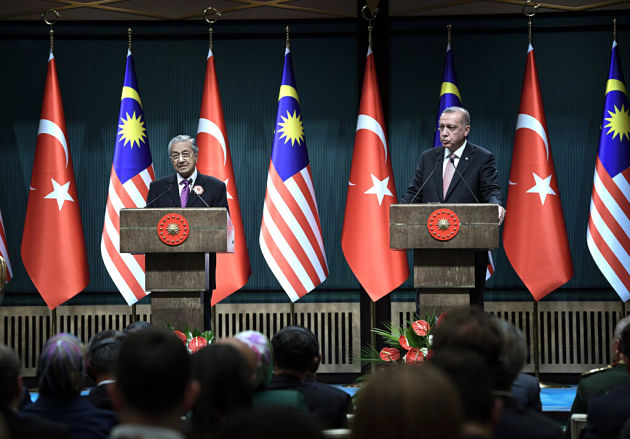Malaysian Prime Minister Mahathir Mohamad’s visit to Turkey last week was marked by discussions not only on the development of bilateral relations between the two countries, but also on the problems and prospects of the entire Islamic Ummah. Mahathir delivered a speech on this topic in which he emphasized that Malaysia and Turkey share the same vision, citing Palestine as an important example of this shared perspective. It is worth noting that Mahathir has frequently made strong anti-Zionist statements, leading his enemies to label him an “anti-Semite. In addition, he has stated that the root cause of the problem of terrorism is the oppression of certain groups, and therefore it cannot be solved by force alone.
The Malaysian leader then turned his attention to the problems facing the entire Ummah. He emphasized that once there was a great Islamic civilization, but today the Ummah is oppressed. Many countries within the Ummah cannot even form their own governments. He urged an understanding of the turning point that led to the decline of Islamic civilization, believing that by understanding the cause, it may be possible to restore the greatness of Islamic civilization that will amaze the world.
For many, Mahathir’s statement was seen as a sensation, but it should be noted that he has made similar statements before, most notably in his controversial speech at the Organization of Islamic Cooperation in 2003. In that speech, he not only emphasized the struggle against international Zionism, but also stressed the need for Muslims to acquire secular knowledge and advanced technology, develop their countries, and consolidate their efforts beyond internal theological differences.
In his recent speech in Turkey, Mahathir was more specific. He reiterated the need for close cooperation in all fields between Malaysia, Turkey and Pakistan, saying that only developed Muslim countries can become the driving force for the revival of the Islamic world. If we look at the map, these three countries are capable of being the ideological and civilizational leaders of the Muslim segments in three macro-regions: Malaysia in Southeast Asia, Pakistan in South and parts of Central Asia, and Turkey in the wider Ottoman space, including Anatolia, Turkic-speaking parts of Central Asia, the Caucasus, the Middle East, and the Balkans.
It is no coincidence that Saudi Arabia and the United Arab Emirates, on the one hand, and Iran, on the other, were excluded from this axis of Islamic civilizational revival identified by Mahathir. Their unsuitability for this role has long been evident, but can these three countries mentioned by Mahathir succeed in the great, truly epoch-making historical task of reviving Islamic civilization?
We would like to think so, but words alone are not enough. This is exemplified by a young Malaysian journalist’s question to Mahathir about concrete measures to protect Muslim minorities such as the Uighurs, and Mahathir’s response. He rightly pointed out that it is easy to make statements, but effective action is needed, emphasizing once again that cooperation between Malaysia, Turkey and Pakistan could contribute to this.
In the past, the cooperation between post-war Germany and France became the foundation upon which the still unfinished construction of a united Europe was built. To achieve this, however, it was necessary to go beyond bilateral relations, to initiate a supranational integration process, and to invite other European countries to join.
Will Turkey, Pakistan and Malaysia be able to initiate a similar process? Or will each remain on its own, and all talk of Islamic unity will remain talk?

